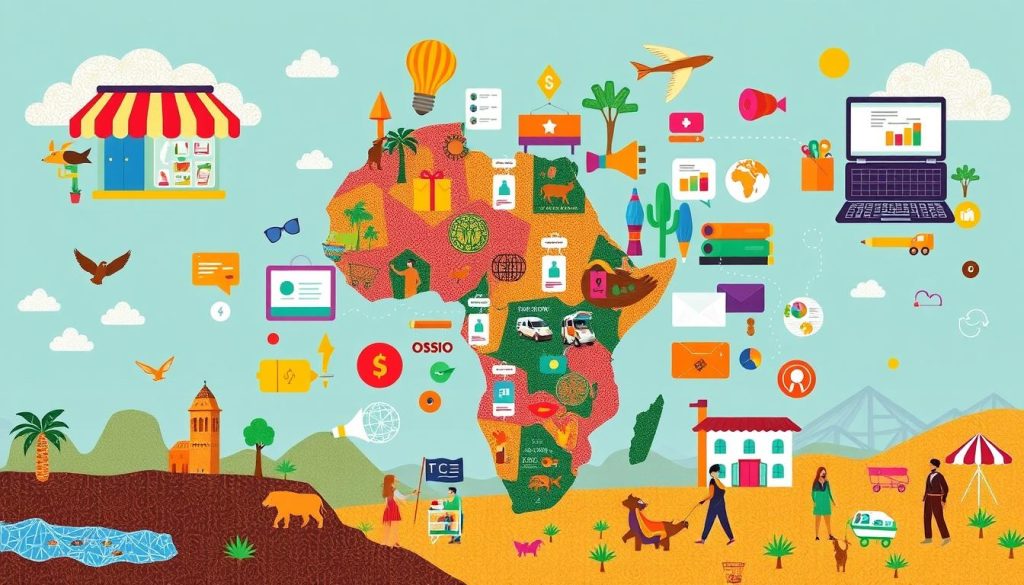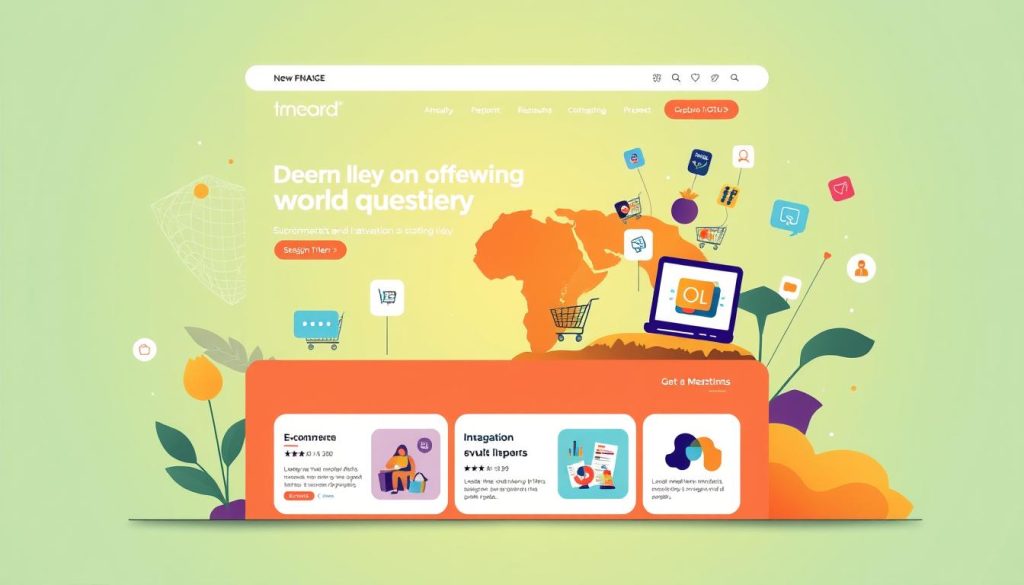The digital world in Africa is full of chances for new business owners. E-commerce is a key player in the continent’s economic growth. This guide will help you learn how to start a business in Africa.
It will cover the basics and strategies for success. You’ll learn about the market and how to use your entrepreneurial skills. This way, you can build a successful online business that helps the African economy grow.
The Importance of Online Businesses in Africa

Online businesses are key in Africa’s economy. They help shape the economic landscape across the continent. These businesses create jobs, bring in taxes, and boost economic growth.
The internet has changed how businesses operate. It lets companies innovate fast and meet customer needs better. The International Telecommunications Union (ITU) shows the internet is getting more popular in Africa. This makes having a strong online presence even more important.
- Online platforms provide entrepreneurs with accessibility to larger customer bases.
- Small businesses benefit from reduced operational costs associated with online sales.
- Online marketing strategies enhance brand visibility and consumer engagement.
Identifying Profitable Niches in the African Market

Finding profitable niches is key for entrepreneurs starting online businesses in Africa. Many sectors offer great opportunities, thanks to changes in how people shop and what they want. Health and wellness, fashion, tech, and agriculture are growing fast.
It’s important to understand what African consumers like and can afford. Their tastes and spending power vary a lot across the continent. Businesses that get this can offer products that really meet their needs.
Reports from firms like McKinsey & Company show new trends to follow. Doing deep market research and keeping up with what people want is crucial. By focusing on the right niches, entrepreneurs can stand out and meet the changing needs of African shoppers.
How to Start an Online Business in Africa

Starting an online business in Africa means understanding the legal rules of each country. Knowing these rules is key to success in this market. Entrepreneurs should spend time learning about local laws, taxes, and e-commerce rules to avoid problems.
Understanding Legal Requirements
Legal rules in Africa cover a lot and change a lot from country to country. Business owners need to know:
- Local laws about online deals.
- Taxes for e-commerce businesses.
- Rules about consumer rights and data protection.
Knowing these rules helps protect businesses and build trust with customers.
Registering Your Business
Registering a business involves several steps that follow African rules. Entrepreneurs may need to:
- Get the right permits and licenses for online business.
- Submit registration papers to the right government offices.
- Follow rules specific to their business type.
Using the African Development Bank’s guidelines can make this easier. It helps understand the legal framework for success in the digital world.
Choosing the Right Business Model

Choosing the right business model is key for anyone starting online. The digital world keeps changing, and knowing the different models helps entrepreneurs. They can match their goals with what their market needs. Traditional e-commerce and dropshipping are two main types. Subscription services also offer a steady income stream.
Traditional E-commerce vs. Dropshipping
Traditional e-commerce means buying lots of items, storing them, and handling delivery. It gives you control over stock and can lead to higher profits. But, it needs a big upfront investment and lots of work.
Dropshipping, however, lets you sell products without keeping any stock. You can offer many products without worrying about unsold items. This makes dropshipping great for new businesses or those with little money. Each model has its benefits, and you need to think about costs and what you can do before deciding.
Subscription-based Services
Subscription services are becoming popular in many fields, like beauty, food, and entertainment. They offer a steady income because customers pay regularly. People like the ease and personal touch that subscriptions offer.
Starting subscription services in Africa could lead to new ideas. It encourages entrepreneurs to find areas with ongoing demand. This way, they can innovate and grow.
Creating an Effective Business Plan

A good business plan is like a roadmap for online entrepreneurs. It should have many parts, like market research, executive summaries, and financial plans. It’s important to clearly state what your business offers and who it’s for. This helps in planning and understanding the market better.
Writing a business plan needs careful thought about the market. This helps entrepreneurs get ready for future challenges. The Small Enterprise Development Agency (SEDA) of South Africa provides templates and advice for planning.
Here are the main steps to make a strong business plan:
- Do deep market research to find trends, chances, and problems.
- Write a clear executive summary that covers the plan’s main points.
- Outline how the business will work every day in the operational plans.
- Look at financials to see if the business can make money and grow.
Building a User-Friendly Website

A well-structured website design is key to any online business’s success. It’s vital to focus on user experience and add important e-commerce features. A website that’s easy to use not only keeps customers coming back but also boosts sales.
Essential Features for Your Online Store
Adding specific features can greatly improve your online store’s functionality:
- Secure payment gateways to protect customer transactions.
- Mobile responsiveness to cater to users on various devices.
- Fast loading times to improve user engagement.
- Easy navigation to help users find products without hassle.
- Blog or information sections that promote engagement and improve SEO.
Websites that focus on user experience tend to keep customers loyal and increase sales. Platforms like WooCommerce and Shopify offer templates that mix good looks with essential e-commerce features. This ensures a smooth experience for users.
Marketing Strategies for Online Businesses

Effective marketing strategies are key for online business success. A strong digital marketing plan boosts visibility and sales. Here are ways to improve your marketing in Africa.
Leveraging Social Media Marketing
Social media like Facebook, Instagram, and Twitter are great for reaching people. In Africa, many young people use these platforms. So, it’s crucial to make content that they’ll enjoy. Here are some tips:
- Create posts that grab attention with good visuals.
- Chat with followers using polls and Q&A.
- Use ads to target specific groups of people.
Utilising Search Engine Optimisation (SEO)
SEO is important for getting more people to visit your site. Make sure your site is easy to use and has good content. Here’s how to do better SEO:
- Find out what keywords people are searching for.
- Write articles that answer questions in your field.
- Keep your site up to date with search engine changes.
Understanding Payment Gateways in Africa

Choosing the right payment gateways is key for smooth online transactions in Africa. A good payment solution boosts customer happiness and keeps payments safe. PayPal, Flutterwave, and Paystack are top choices. They support local currencies and fit well with African banking systems.
When picking payment gateways, consider these key points:
- Reliability: A trustworthy gateway builds customer trust.
- Fees: Knowing the costs helps manage business expenses.
- Payment options: More choices mean happier customers and more sales.
It’s also crucial to know the rules set by African Central Banks. Following these rules makes online payments secure. This boosts the trust in online shopping.
Logistics and Supply Chain Management

Effective logistics and supply chain management are key to e-commerce success. Entrepreneurs need to look at different logistical options. This ensures products are delivered efficiently to customers.
Working with local couriers and logistics providers helps meet customer needs. It combines local knowledge with global standards. This makes a company’s service better and keeps it competitive.
A study by the African Logistics Network shows good logistics can cut costs. Businesses that improve their supply chain do better. They also make customers happier. Here are some important points:
- Warehousing solutions that make the most of space.
- Tracking inventory in real-time to avoid stockouts.
- Choosing shipping that’s both affordable and reliable.
A strong logistics system is the backbone of a successful supply chain. It drives e-commerce success and meets customer needs.
Customer Service Excellence in Online Business

Exceptional customer service is key to success in online business, especially in competitive markets. It boosts customer satisfaction, loyalty, and repeat sales. Businesses need to offer various support channels like live chat, email, and social media.
A strong feedback system is vital for understanding customer satisfaction. It helps businesses solve issues quickly and improve their services. Research shows that focusing on customer experience leads to better performance than competitors.
Companies like Jumia and Konga are leaders in customer service in Africa. Their focus on efficient online support sets high standards. This shows how prioritising customer satisfaction can drive growth and keep customers coming back.
Analytics and Performance Tracking
![]()
Analytics and performance tracking are key for any online business to succeed. They help entrepreneurs understand how customers interact and behave. This knowledge leads to better business decisions. Many e-commerce tools help track important metrics.
Tools for Monitoring Traffic and Sales
Choosing the right analytics tools can change a business’s approach. Here are some tools to consider:
- Google Analytics: A powerful tool for monitoring website traffic, user engagement, and conversion rates.
- SEMrush: Provides insights into SEO performance and strategies for optimising online visibility.
- Hotjar: Offers heatmaps and session recordings to observe user behaviour on your site.
These tools help track performance and identify strengths and weaknesses. Data from analytics leads to smarter marketing and higher conversion rates.
Networking and Building Partnerships

Building a strong network is key for success in Africa. Networking lets you meet potential partners and people with similar goals. Online groups, social media, and forums are great for making business connections.
Strategic partnerships help share resources, improve skills, and reach more markets. By working together, entrepreneurs can come up with new ideas and grow sustainably. Joining local trade groups and attending events can also boost your profile and open up collaboration chances.
The African Union has started many projects to boost business networking. By getting involved, entrepreneurs can expand their network and find new markets. This focus on teamwork makes the business world more lively and strong.
Staying Compliant with Local Regulations
Keeping up with local rules is key for online businesses in Africa. Following the law helps avoid legal trouble and builds trust with customers. It’s important for business owners to stay updated on e-commerce rules, consumer protection, and data privacy.
Working with legal experts who know tech and commerce is crucial. They help understand and meet legal standards. Websites of national agencies, like the Economic Community of West African States (ECOWAS), are great for staying informed about changes.
Staying compliant means online businesses follow the law in their countries. This lowers risks and boosts credibility. By focusing on legal knowledge and getting good legal advice, entrepreneurs can succeed in the online market.
















